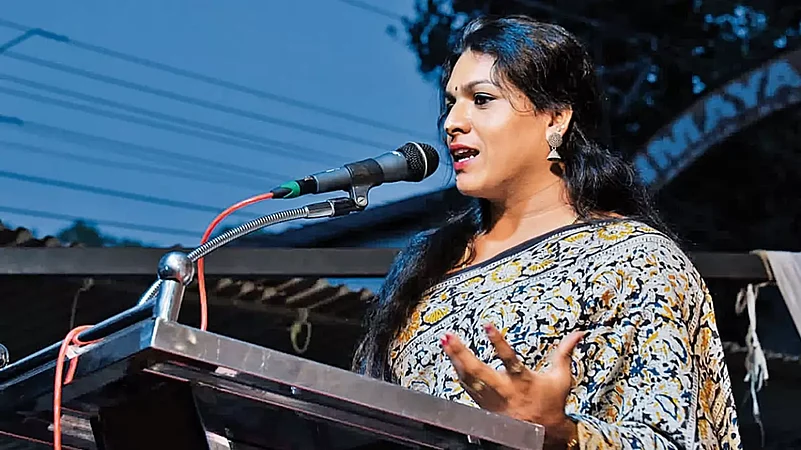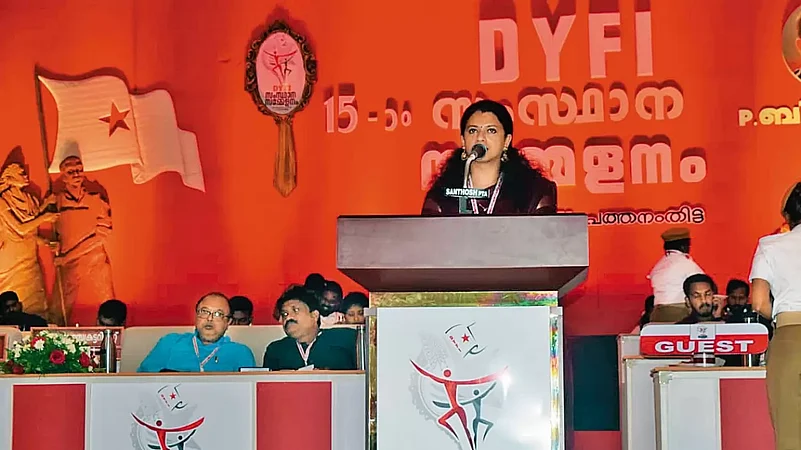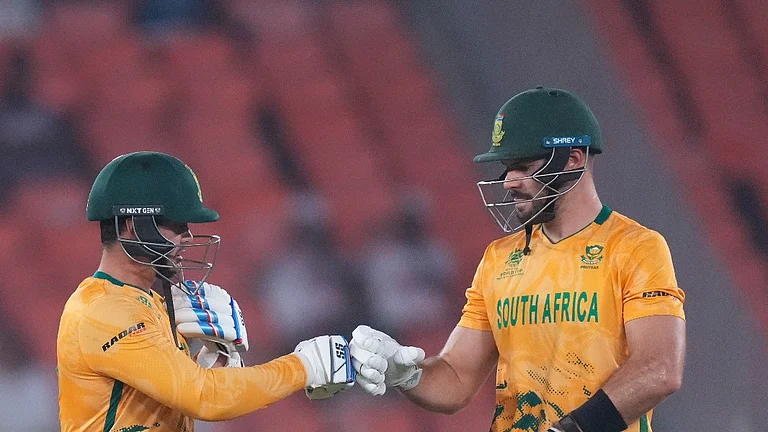Twenty-eight-year-old Laya Maria Jaison is keen on avoiding the constant introduction of herself as a transgender individual. “Gender identity holds relevance only in specific contexts, not as an omnipresent descriptor. Are cisgender men or women consistently defined by their gender identity?” asks Laya, who is currently engrossed in the election campaign in the Puthuppally Assembly constituency in Kottayam district. The by-election in Puthuppally, scheduled to be held on September 5, is due to the passing of the former Chief minister and veteran Congress leader, Oommen Chandy. Laya Maria serves as a state committee member of the Democratic Youth Federation of India (DYFI), the youth wing of CPIM, and has taken charge of the campaign activities within the constituency.
“Her political clarity and maturity is impressive,” says Reji Sakkariyas, the Kottayam district secretariat member of the CPI(M), expressing his admiration for her remarkable political clarity and maturity. He highlights her uncommon ability to engage with mainstream society through conversation rather than confrontation. He notes that she pursued her post graduation in a Women’s College that exclusively admits men for PG Courses. “Despite facing isolation and harassment during this transitional period, she confronted these challenges with courage,” says Sakkariyas. Her responsibility includes organising the campaign for the LDF candidate, Jaik P Thomas. In contrast, the UDF has nominated Chandy Oommen, the late former chief minister Oommen Chandy’s son.
Laya strongly critiques the Congress Party’s entrenched practice of “dynastic politics”, wherein it opts for family members of deceased incumbents, banking on sympathy votes. “Their unwillingness to engage in a developmental discourse is evident,” says Laya. For her current endeavours, the aspect of gender holds no significance. “As a political activist and a representative of DYFI, I am at the forefront of this by-election campaign. Why should my gender be of any consequence?” asks Laya.

Laya represents an emerging line of thinking within the transgender community in Kerala. Both the CPI(M) and the Congress have taken proactive steps to welcome transgender individuals into their fold. “I identify myself as a trans woman, yet my identity extends to that of a political activist,” affirms Shyama S Prabha, state general secretary of the Democratic Transgender Federation of Kerala, a recently-launched transgender organisation affiliated with the CPI(M). Shyama is also a member of the Thiruvananthapuram District Committee of the DYFI. “Our efforts are not confined solely to the transgender community. Any issue concerning the general populace falls within our purview—whether it’s the escalation in the prices of essential goods, petroleum and diesel, or even legislation such as the CAA. We, as the most vulnerable segment of society, bear the brunt of such challenges,” explains Shyama.
The transgender community in Kerala is undergoing a transformative phase as it secures a concrete foothold in mainstream politics. Both the CPI(M) and the Congress have established substantial organisations dedicated to transgender individuals. Parallel to the Democratic Transgender Federation, the Congress has initiated an entity for the transgender community—the Transgender Congress—which was established three years ago. The then party chief, Mullappally Ramachandran, announced the distribution of membership to 50 trans persons as a beginning. “An organisation has become inevitable. The LDF government provides all incentives and welfare schemes only to Left supporters in the community,” alleges Arunima M Kurup, the president of the Kerala Pradesh Transgender Committee.
The Democratic Transgender Federation of Kerala was established in 2019 with the participation of 780 members, according to its leaders. “Although we launched the organisation with an initial membership of 780, the progress of our activities was hindered by the onset of Covid. We were unable to expand our membership campaign. In July 2023, we successfully conducted a state-level convention, which was inaugurated by R Bindu, the minister for higher education,” explains Shyama.
Impact of Transgender Policy
Kerala took a pioneering stride by implementing the Transgender Policy back in 2015, a significant step that preceded the passage of the Union government’s Transgender Persons Act in 2019. A comprehensive survey, spearheaded by Bengaluru-based NGO, Sangama, was tasked to identify transgender individuals across the state to provide a guiding framework for policy formulation. The landmark NALSA judgment (National Legal Service Authority Vs Union of India) and the subsequent State Transgender Policy emerged as catalysts, prompting many to return to their roots, reaffirm their identities and aspire to lead lives of dignity.
The impact of these changes was profound, as affirmed by numerous trans persons. They attest that the NALSA judgment and the State Transgender Policy have been instrumental in encouraging them to embrace their true selves openly. “I publicly declared my identity shortly after the policy was announced. It wasn’t just me; many individuals in the community made the bold choice to step forward,” asserts Laya. In 2020, Laya’s journey commenced as a member of the local unit of DYFI in Kottayam district. Swiftly rising through the ranks, she was elevated to the District Committee (Kottayam) in 2022. Within the same year, Laya was asked to attend the state committee during the annual conference. Laya’s allegiance to the CPI(M) did not begin from the childhood, as her family did not hail from a tradition of Left-leaning support. Her engagement with the CPI(M) began in 2018 when she was selected to work as a project assistant in the state transgender cell. Reflecting on this transformative experience, Laya explains, “My involvement with the cell exposed me to the various programmes and policies of the LDF Government.”
Unlike Laya, Shyama hails from a family which has been traditionally associated with the Left. From her early childhood, this familial influence embedded a deep-rooted political awareness within her. As she pursued her higher education at the University College, Thiruvananthapuram, her involvement with the Student Federation of India (SFI), the student-wing of CPI(M), burgeoned significantly. Her time at the University College—between 2008 and 2013—not only enabled academic growth, but also forged a fervent dedication to her political engagement within the SFI. However, this period was not without its challenges. Shyama encountered the persistent stigma associated with being a transgender person in a cis-dominated political milieu. The gender-based prejudice she faced resulted in her enduring mental harassment, often subjected to ridicule and exclusion. The absence of traditionally “masculine” attributes made her a target for disparagement. Yet, Shyama refused to retreat into the confines of isolation. Instead, she tenaciously upheld her active role within the student movement, defying the odds and striving to make her voice heard despite the adversity she confronted.
Karnataka: Representation in Employment
Karnataka garnered national acclaim when it became the pioneer to implement horizontal job reservations in public employment for transgender individuals in 2021. Even the recently-concluded assembly elections cantered around pledges for the betterment of the transgender community. However, despite the fact that two years have passed since the policy was introduced, a majority of third gender individuals continue to grapple with obstacles when they attempt to apply for these positions. As a result, their optimism has waned amidst unfulfilled assurances.
“We scarcely come across any advertisements or notifications that cater to trans individuals in government jobs. And on the rare occasions, when such notifications do arise, the eligibility criteria often appear misaligned,” reveals Uma, a trans woman residing in Bengaluru. She points to an instance where job openings were advertised for “trans purusha,” which translates to trans-men. While comprehending the complexities surrounding gender and identity are essential, addressing these issues can only transpire through direct engagement with the community. “We are more than willing to enlighten them, but unfortunately, the consultation process has largely remained absent,” laments Uma.
In 2021, Janavi, a trans woman, applied for a position in the Karnataka police department. After successfully clearing the physical endurance test, which included running, long jump and shot put, along with the written examination, Janavi had optimistic expectations of advancing further. However, her optimism was dashed when the provisional list was unveiled—her name was not there. “I was informed that my physical fitness did not meet the job’s requirements,” says Janavi.
Leading up to the last state elections in Karnataka, the Congress party unveiled its manifesto, extending promises to transgender individuals. The party committed to reserve a minimum of one per cent of positions for the ‘third gender’. In a noteworthy approach, the party collaborated with NGOs dedicated to transgender welfare, including Ondede (meaning unity in Kannada), to help formulate policies for the community’s benefit. One pledge, “to establish a Mangalamukhi Welfare Board by allocating Rs 200 crores annually,” found its place in the manifesto. However, much to the dismay of the transgender community in the state, the budget presented by the Sidharamaiah government on July 7, 2023, revealed no allocation of funds for this initiative.
Tamil Nadu stands out as the pioneer in establishing a Transgender Welfare Board in 2008. With an illustrious history of enhancing the rights of the transgender community on multiple fronts, the state introduced cost-free sex reassignment surgery for the community members. This provision attracted numerous transgender individuals from neighbouring states to undergo the surgery in Tamil Nadu. Despite its rich history of LGBTQ rights, the representation of the transgender community in Tamil Nadu’s political landscape remains limited. “None of the leadership roles are occupied by trans persons,” concedes advocate Saravanan, the DMK spokesperson. He acknowledges the party’s ongoing endeavours to integrate the transgender community, citing Riya, a 30-year-old ward councillor in Tiruchengode town, Namakkal district, who contested as a DMK candidate in the 2020 local body elections and won by a margin of 950 votes.
Despite symbolic efforts to extend membership to the transgender community, all political parties have considerable strides to make. Despite innovative measures taken by the Congress and the CPI(M) in Kerala, no member from the LGBTQ community received a ticket in the recent elections, including the 2020 local body election. There is a substantial journey ahead for these parties to illustrate their commitment to empowering the community.
Shahina K K in Thiruvananthapuram with Anisha Reddy
(This appeared in the print as 'Transcending Barriers')






















